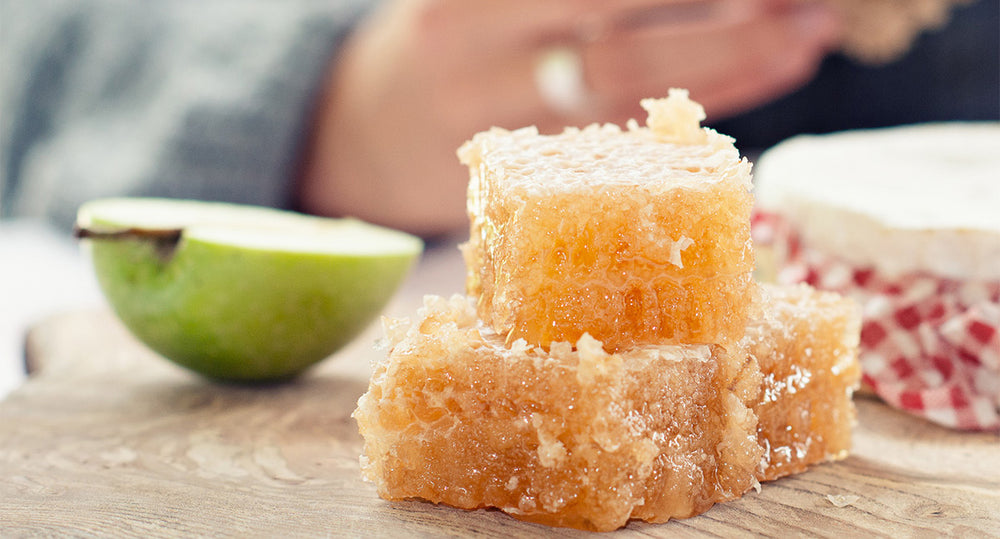Does Honey Expire or Go Off?
How are you when it comes to best before and use by dates on foods? Are you the kind of person that’s strict and throws something away the day before the date stamped on the packaging? Or are you more of an “it’s passed the sniff test and there’s no visible mould so it’s ok” kind of person? *
We’re not here to judge either way (but we really don’t like food waste so our advice is to shop sensibly so that you’re not throwing away good food). However, we are here to answer your top two questions on honey – a) does honey go off and b) is it ok to eat crystallised honey?
The short answers are a) no, and b) yes. So read on to discover why honey doesn’t expire and why it’s perfectly fine to eat crystallised honey!
Can I Eat Out of Date Honey?
Most pots of honey come with a best before date stamped on the bottom, and you’ll notice that this is a very long date of several years. But the truth is, honey probably won’t ever go off. In fact, archaeologists have found pots of honey thought to be thousands of years old, still perfectly preserved – even in the tomb of Tutankhamun! Researchers are said to have tasted it, and discovered that it was still sweet and honey-like.
So if it’s good enough for King Tut to take on his afterlife journey, then eating years’ old honey is good enough for us, too. There’s no need to worry about honey being “out of date” at all – it’ll still taste great.
But how does honey achieve this eternal youth?
The Secret Behind the Immortality of Honey
Looking for the answer to an eternal existence? Honey has beaten you to it. It turns out, honey’s secret is a combination of low water content, high sugar content and some bee magic.
Honey is around 17% water – which is too low for bacteria, fungi and moulds to grow. Add to this the fact that sugars are hygroscopic, meaning that they contain very low moisture levels and effectively suffocate microorganisms - food spoilage bugs don’t stand a chance. Plus, honey is acidic, with a pH of 3 to 4.5, meaning that any bugs that do make it through the arid conditions, are killed by the acidic conditions.
But crucially, during the production of honey, bees dehydrate the nectar they diligently collect from flowers (nectar has a high water content of around 70%) by flapping their wings to remove moisture. They also add an enzyme to honey called glucose oxidase that creates hydrogen peroxide that inhibits bacterial and mould growth.
All of these factors combined make honey a very inhospitable environment for microorganisms to thrive, and therefore, it doesn’t spoil if kept in a jar with a tight seal. And this means that honey won’t go off! (It all adds to the amazing taste of honey, too.)
Is it Ok to Eat Crystallised Honey?
You may have noticed that sometimes, honey can crystalise and become hard. While this might not look like honey we can eat, it’s still completely safe to consume.
Crystallised honey may appear opaque or white, and may look slightly grainy. This is down to the low water content too - there’s simply too much sugar to dissolve in what little water is present. Therefore sometimes, honey will crystalise and it’s a totally normal process. Crystalised honey is still edible, even though it may be more difficult to get out of the jar, so here's some tips on storing honey to help prevent crystals forming.
Choose High Quality Honey for Full Flavour and Health Benefits
So, now you know, why not stock up on some delicious, healing, active honey from Necta & Hive? Choose between full bodied Jarrah with a caramel-like flavour, and Marri for a milder sweet taste - both are packed with health benefits. It’ll stay safe in your food cupboard for years – if temptation allows it to last that long!
(A quick note on the difference between best before and use by dates. According to the UK’s Food Standards Agency (FSA), best before is about quality and use by is about safety. Best before dates are used on dried, tinned and frozen foods to denote the time past which a food will still be safe to eat, but may not be at its best quality. It’s safe to consume a food past its best before date. Use by dates on the other hand, are used on fresh foods that perish quickly, such as fresh meat, fish and milk. It may be harmful to eat a food past its use by date and it may contain dangerous levels of bacteria.)






